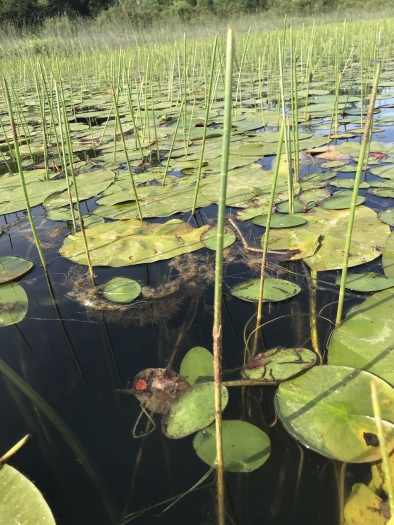Horsetail Spike-Rush
(Eleocharis equisetoides)
Horsetail Spike-Rush (Eleocharis equisetoides)
/
/

Sheila Collins Bourgoin
CC BY 4.0
Image By:
Sheila Collins Bourgoin
Recorded By:
Copyright:
CC BY 4.0
Copyright Notice:
Photo by: Sheila Collins Bourgoin | License Type: CC BY 4.0 | License URL: http://creativecommons.org/licenses/by/4.0/ | Rights Holder: Sheila Collins Bourgoin | Publisher: iNaturalist | Date Created: 2019-06-30T22:15:25Z |












Estimated Native Range
Summary
Eleocharis equisetoides, commonly known as Horsetail Spike-rush or Knotted Spike-rush, is a perennial herb native to freshwater marshes, wet meadows, and shallow waters along the Atlantic coastal plain and Great Lakes region of the United States and Ontario. It typically grows in dense colonies with hollow, cylindrical stems that can reach up to 40 inches (100 cm) in height. The stems have transverse septa, giving them a jointed appearance reminiscent of the unrelated Equisetum species (horsetails). The plant produces inconspicuous greenish-brown flowers from late spring to summer, which are less showy than its structural form.
Horsetail Spike-rush is valued for its ability to stabilize soil and filter water, making it an excellent choice for riparian restoration projects and constructed wetlands. It is also used ornamentally in water gardens and naturalistic landscaping. This plant prefers full sun to part shade and requires consistently moist to wet soil conditions. It is generally low-maintenance but may require management to prevent excessive spread in smaller water features.CC BY-SA 4.0
Horsetail Spike-rush is valued for its ability to stabilize soil and filter water, making it an excellent choice for riparian restoration projects and constructed wetlands. It is also used ornamentally in water gardens and naturalistic landscaping. This plant prefers full sun to part shade and requires consistently moist to wet soil conditions. It is generally low-maintenance but may require management to prevent excessive spread in smaller water features.CC BY-SA 4.0
Plant Description
- Plant Type: Grass
- Height: 3-5 feet
- Width: 1-2 feet
- Growth Rate: Moderate
- Flower Color: N/A
- Flowering Season: Spring, Summer, Fall
- Leaf Retention: Deciduous
Growth Requirements
- Sun: Full Sun, Part Shade
- Water: High
- Drainage: Standing
Common Uses
Erosion Control, Low Maintenance, Water Garden
Natural Habitat
Freshwater marshes, wet meadows, and shallow waters along the Atlantic coastal plain and Great Lakes region
Other Names
Common Names: Jointed Spike-Rush, Jointed Spikesedge, Knotted Spike-Rush
Scientific Names: , Eleocharis equisetoides, Eleocharis elliottii, Limnochloa equisetoides, Scirpus equisetoides,
GBIF Accepted Name: